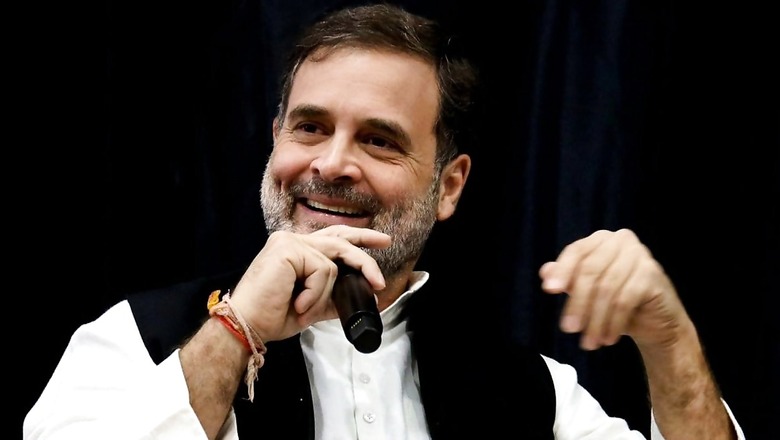
views
We’re getting used to Rahul Gandhi’s soliloquies on the situation “back home” when he travels to foreign countries. Perhaps, there’s something about the clear air in these locales that allows his thoughts to float to the surface. In India, the pollution can assume the form of a miasma that oppresses the mind.
And so, in the US of A, Rahul Gandhi has expounded on his latest thesis. And why not? After all, even his mentor, Sam Pitroda, who puts on these foreign junkets for his favourite protégé, says Rahul has a well-informed perspective on things around him. Unlike ‘Pappu’, his BJP-conjured alter ego.
Ensconced in a university in Texas, Rahul warmed up with a spot of Civics 101 reminding his grasping audience that India was a “union of states” much like the US and, therefore, no one singular allegedly overbearing entity, like for instance the RSS and Narendra Modi’s BJP, could impose a singular dogma upon all Indians. After making that point, Rahul Gandhi pivoted to metaphysics.
On this rather esoteric matter, he proceeded to acquaint his listeners with the real meaning of the term devta as it appeared to him. And because the audience was obligingly attentive, he came to the subject of economics — to be precise — global macroeconomics. A subject that he regards as his strong suit.
“The West,” Rahul proclaimed, “has an employment problem. India has an employment problem… But many countries in the world don’t have an employment problem. China certainly doesn’t have an employment problem. Vietnam doesn’t have an employment problem… The act of production creates jobs. India has to think about the act of production and organising production… It’s not acceptable that India simply says, okay, production is going to be the preserve of the Chinese…”
Rahul Gandhi is right in his unqualified praise for China, especially its formidable prowess in manufacturing. But, his comments do betray a startling lack of nuance. We’ll get to that.
But, first let’s go over some data that will reveal that China isn’t exactly flush with jobs, that Chinese GDP per capita declined in 2023 — the first time in decades. And that India is growing faster on the back of an ambitious Modi-driven ‘Make in India’ policy, which is also beginning to hurt China. For one, it is under the present NDA that the US has replaced China as India’s top goods trade partner.
In the crucial 15 to 24 demographic, China’s unemployment rate at 15.7 per cent is almost even with India’s 15.8 per cent. China’s share in India’s imports has declined from the 2020-21 level of 16.5 per cent to 14.7 per cent in the first quarter of 2024-2025. This shows India is becoming ‘atmanirbhar’.
Most importantly, India’s GDP at 7.6 per cent is growing faster than China, which is at 5.2 per cent. In fact, this has been the trend over the past three years. Though these figures reveal that India is growing at a fast clip, economic growth is unlikely to touch the double-digit levels that China achieved through the noughties.
This is primarily because India will never liberalise as much as China did to create that heady mix of policies and conditionalities that big businesses flock to. For such an informed mind, it is surprising that Rahul Gandhi conveniently omitted that China’s stupendous growth was on the back of a reform model that could only be rolled out on the point of a gun in autocracies.
And it isn’t as if China’s come-hither economic model hasn’t been without consequence. Many an expert have pointed out that rapid manufacturing growth in China has physically scarred the country and also broken the back of many of its citizens. Especially its poorest, a class of people in India who Rahul Gandhi looks out for with singular focus.
China’s government forcibly acquired land from farmers and villagers at below-market rates without fair compensation or relocation support. Since 1950s, 70 million people involuntarily relocated for setting up special economic zones (SEZ). Its governments would lease land to developers and factories for extended periods (up to 70 years), effectively handing control of the land. This is inconceivable in India.
Horror stories have emerged of industrial-scale labour exploitation. Right from the punitive ‘996’ (9 am to 9 pm x 6 days) work week, to being denied the right to rest or the lack of access to social benefits, not to mention the Chinese workforce’s increasing vulnerability to wage theft.
There’s even discrimination in recruitment, especially based on age and ethnicity with no one to champion worker interests owing to the state suppression of labour unions and collective bargaining. Environmental regulations are routinely waived.
Many Chinese companies are also provided institutional support to circumvent intellectual property (IP) protection laws, and international protocols on preventing forced technology transfer from foreign companies. In its pursuit of conquering global markets by undercutting competition, China has resorted to unfair trade practices, rigging tariffs and even its currency.
These shenanigans would never fly in India. Its messy democracy works as a check and balance on any your-way-or-the-highway reforms undertaken by totalising governments. Just ask Rahul Gandhi. If it is anyone, it is the Congress and its appetite for economic virtue signalling, that has stalled reforms that could have accelerated manufacturing and consumption-led growth in India.
In 2020, the NDA got Parliament to approve three labour codes. These would have removed impediments to winding up of companies. Allowed for firing of staff without government permission in firms with up to 300 workers, up from 100. These laws would have interested multinational companies to set up shop in India.
But, the codes had to be put on the ice because the Congress opposed the “anti-labour” legislations claiming that they “weakened” trade unions and removed the “security net” for workers. The three farm laws and the Land Acquisition Bill, 2015, met with the same fate. They, too, were deemed “anti-people and pro-big business”.
It is all very well to give sermons, but if Rahul Gandhi really wants India to start “thinking about the act of production”, perhaps he could take his foot off the brakes he’s applied to Modi’s ambitious reforms agenda.
(Views expressed in the above piece are personal and solely those of the author. They do not necessarily reflect News18’s views)



















Comments
0 comment